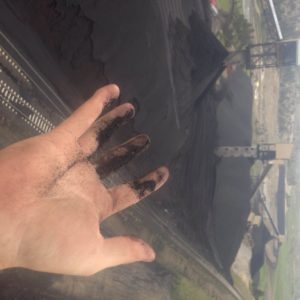When I was younger I could pretty easily be convinced of one side of an environmental issue if that side was in  line with my current beliefs. For example, it was easy to believe that coal (and everything related to its extraction, production, and use) was bad because I was told so and I didn’t know the other side of the story.
line with my current beliefs. For example, it was easy to believe that coal (and everything related to its extraction, production, and use) was bad because I was told so and I didn’t know the other side of the story.
However, after 4 years of environmental studies classes at university, I’ve come to realize that many issues are multifaceted and we must study all angles before forming a concrete belief. This is more apparent than ever during my Wild Rockies Field Institute Cycle the Rockies course. Everything we’ve read presents different viewpoints and new sides to issues I hadn’t thought of before. The people we’ve spoken with have presented new ideas and stumped us with some pretty big questions. There are pros and cons to coal, and different people have different belief systems that determine, in their eyes, which are the pros and which are the cons.
So far, the two general sides have been presented like this:
Pros: reliability, relative affordability, abundance of coal, job creation, and momentum (we already have the infrastructure).
Cons: emissions, land rights issues, water contamination, poor environmental remediation, and coal getting shipped overseas.
Some people may place different aspects in different categories.
Talking to different individuals involved at both ends of the spectrum has made me way more informed, but also still indecisive. People fighting coal expansion, like Steve Charter (a rancher who grazes his cattle above the signal Peak coal mine), try to understand the coal companies and get along. Similarly, the foremen we spoke with at Signal Peak also try to understand the rancher’s point of view, while admitting that they usually don’t see eye to eye on most issues.
Both groups, ranchers and miners, have equally valid arguments explaining why coal is ‘good’ or ‘bad’, necessary or unnecessary. We are discussing all viewpoints as a group and will ultimately decide, as individuals, where our value systems lie and what we think about the issue.
I don’t think the issue is black-or-white. With what we’ve learned so far, I’ve come to understand that coal will have to stay for a little while longer while we work to develop new technologies for alternative energy, find ways to create jobs in the sector, and get more people on board using grants and incentives. I do believe that we can’t continue to depend on coal to create electricity the way we currently do. We will have to shift to new ways of making electricity, and it won’t be all that easy. Steve Charter made a good analogy: typewriters used to be the leading technology in typing and employed many skilled people to produce them. But eventually, that technology was replaced with a new one and some jobs were lost in the shift. Most people would argue that we’re in a better place now because of it. I think something similar will need to happen to transition from coal (and other fossil fuels) to cleaner sources of energy. We just need to make sure we are as well-prepared as possible for the coming shift to make it as smooth as possible.